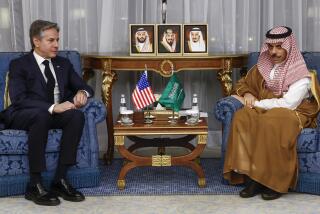Dogged Pursuit of Peace
- Share via
Because he realistically took only the most limited expectations to the Middle East for his first round of shuttle diplomacy, Secretary of State George P. Shultz did not come away from his labors disappointed. Because he did not encounter outright rejection of his efforts as he bounced between Jerusalem, Amman, Damascus and Cairo, Shultz has been inspired to return briefly to the scene. This time, too, American officials are warning not to look for a breakthrough. The point of Shultz’s resumed travels, they say, is primarily to force Arabs and Israelis to continue their own serious internal debates over the issues.
That’s a reasonable approach, applied to what has become an ever-nastier and increasingly rigid standoff--one where the odds have grown longer that reason can be made to prevail. At the moment the hard truth seems to be that the main thing keeping the Shultz mission alive is the reluctance of both the Arab and the Israeli sides to be seen as its executioner. Because of that, Shultz has so far not heard any flat noes to the ideas that he has carried with him. But neither does he seem to have been offered any great encouragement.
What Shultz is up to in essence is gradually and certainly painfully bringing the two sides to the point that they have for so long avoided, where answers to basic questions must finally be given. The central questions are whether the political will exists to trade land for peace, with Israel giving up the Gaza Strip and the greater part of the West Bank in exchange for Arab recognition and largely self-enforcing guarantees of its territorial security, and whether Palestinian self-rule can be obtained without providing for an independent Palestinian state.
So far this approach has found favor with only one-half of Israel’s government--the portion led by Foreign Minister Shimon Peres. Prime Minister Yitzhak Shamir and his Likud faction say that they will never, never, never give up any part of the West Bank. The Palestinians, speaking through the Palestine Liberation Organization, are no less adamant in saying that they will continue to demand an independent state. A further complication has now been raised with an apparent insistence that the Palestinians, represented by the PLO, must be a separate party in any negotiations, rather than participating as part of the Jordanian delegation. U.S. policy is not to talk to the PLO until it renounces terrorism, recognizes Israel’s legitimacy and abandons its “national covenant” calling for the elimination of the Israeli state.
Against this discouraging outlook Shultz has chosen to press on. If nothing else, he wants to make sure that the United States isn’t accused of giving up too easily on its responsibilities. For all sides continue in agreement that Washington remains the essential intermediary in what, increasingly pathetically, is still called the Middle East peace process. If continuing intransigence compels Shultz to abandon his intermediary’s role, it will almost certainly bring to a close the Reagan Administration’s efforts to find common ground between Arabs and Israelis. Nor will the next President be in any hurry to try, unless this fall’s elections in Israel and an unexpected shift toward accommodation in Palestinian ranks produce a markedly changed political climate. The Shultz mission may not be the last chance to bring about change in the Israeli-Palestinian conflict, but it certainly could represent the best chance for some time to come, and in that sobering possibility may lie its major and maybe even its only hope.
More to Read
Get the L.A. Times Politics newsletter
Deeply reported insights into legislation, politics and policy from Sacramento, Washington and beyond. In your inbox twice per week.
You may occasionally receive promotional content from the Los Angeles Times.










